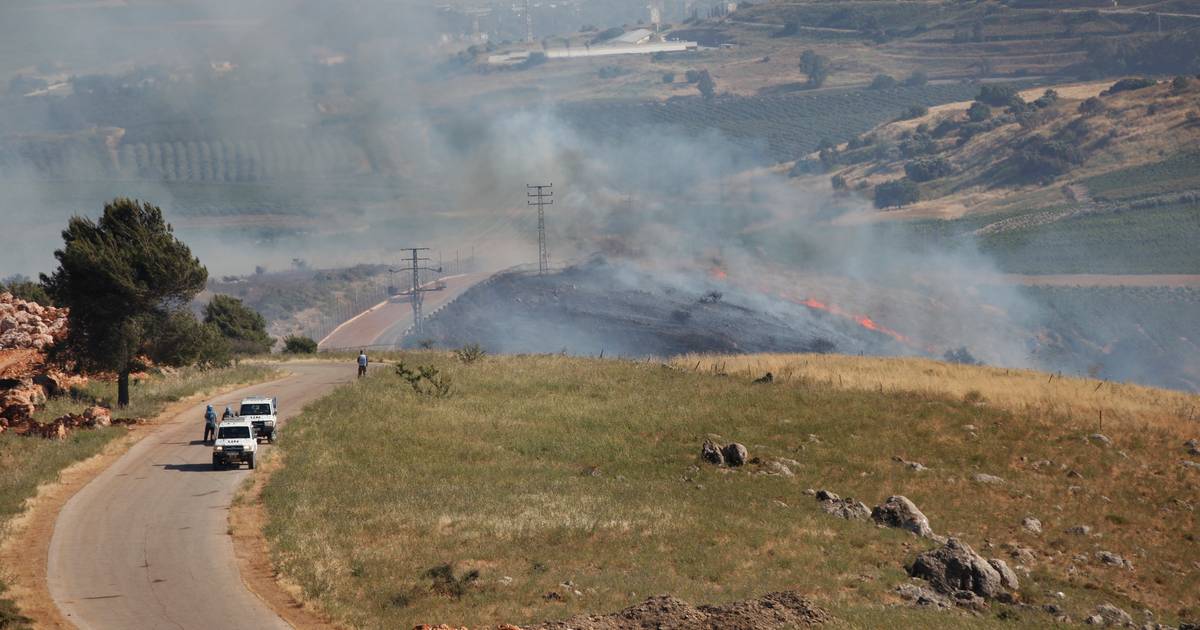Alwaght- In the past few days, Israeli shelling of parts of southern Lebanon once again brought to the spotlight the crisis in the occupied territories. On Thursday, Israeli warplanes launched airstrikes on open areas in Al-Jarmaq and Al-Shawakir in Lebanon's south. Responding to the air raids, on Friday Hezbollah launched rockets on open areas around Israeli military bases in Shebba Farms, an Israeli-occupied Lebanese territory.
The Israeli forces started shelling Lebanon Friday on 11:30 am Lebanon's local time, stated Lebanese government. Around 10 mortar shells hit Al-Sadanah and 30 hit around Bastah and Kifar Shouba towns, causing fires.
Hassan Diab, the caretaker prime minister of Lebanon, called on the UN Security Council to press Tel Aviv to respect the Resolution 1701 and stop violation of the Lebanese sovereignty.
Here is a question: What goals does Israel seek behind striking southern Lebanon? Before answering, we need to shed light on Israeli-Lebanese border disputes.
Border disputes
The Lebanese-Israeli border disputes are in land and sea. Lebanon shares a 79-kilometer land border with occupied Palestinian territories. Since 2000, the year the Israeli forces retreated from southern Lebanon, the Israelis keep occupying Shebba Farms, Kafr Shouba Heights, and Ghajar village, and take provocative actions in them. The latest action was in 2017 when Tel Aviv tried to build a wall from Ras Naqoura to Ulama Al-Sha'ab, Aadaysit Marjaayoun, and Kafr Kila that would have destroyed part of farming lands of Lebanon.
Their dispute at sea is in southwestern part of the Lebanon's Exclusive Economic Zone (EEZ) . In 1995, Lebanon signed the UN Convention on the Law of the Sea, but Israel is not a signatory yet. If Tel Aviv accepted the convention, the dispute over the EEZ would be resolved through international procedures on the continental shelf and the EEZs. So, now the UN role is limited and the borders should be drawn using other procedures. Cyprus, another coastal state, in 2007 drafted an agreement with Lebanon on determining limits of the EEZ between the two countries. But Lebanon refused later because terms regarding the southern parts were ambiguous. In 2009, the Lebanese cabinet cleared up ambiguities, identified 23 regions, and sent the coordinates of the borders of the economic zone with Cyprus to the UN. In 2011, Israel delineated its economic zone, not compliant with Lebanon's 2009 agreement with Cyprus, but under the flawed 2007 agreement that Lebanon did not accept, igniting dispute. The Israeli-drawn zone overlaps 17 kilometers with the Lebanese zone, creating a triangle that forms a disputed area of 850 kilometers. This area is called block 9 in Lebanon zone.
Why is Israel igniting border tensions with Lebanon?
In first place, it can be said that the Israeli shelling is aimed at disrupting Lebanon's stability and security. In recent days, after Najib Mikati was tasked with forming a new cabinet, Lebanon seems to have moved on the path to political stability, and most political observers believe that by forming a new government Mikati can make way for transition from the current years-long political limbo. Under the shadow of new developments, there are chances for a Hezbollah deal with Mikati. If a new cabinet is formed, it is likely that the promised Paris donor conference aids to Lebanon will be released to Beirut. Afraid of a stable Lebanon, the Israelis seek to intensify the internal crisis in the Arab country with their new attacks, all to prevent Hezbollah from coming close to the PM-designate. Hampering the government formation means blocking the international aids.
The second reason is related to Israeli home crisis. Despite the fact that Neftali Bennett took the power as PM, crisis inside the Israeli regime has remained active. Bennett took the office after four general elections in less than two years, and his position is highly shaky as his parliamentary coalition is just one seat ahead of the opposition. Additionally, during the 11-day war on Gaza, Tel Aviv sustained a tangible defeat. Moreover, its policy of curbing increasing Iranian influence in the region has badly failed as Israeli media and experts admit.
It is wise to suggest that Bennett and his security and military team have adopted strategy of 'political conflict for political conflict.' In other words, the Israeli government thinks it needs to create an external crisis to settle or at least cover up its internal crises. A crisis out of the Israeli borders can divert the attention from the home politics. With his predecessor Benjamin Netanyahu tested Gaza and failed, now Bennett is testing Lebanon.
Hezbollah, stronger than ever, watching Israeli actions
Currently, the Lebanese army is considerably weak and unstable. Due to political disputes, its boost has been a side matter. Besides, a large amount of foreign aids it expected have been cut in recent years. When it comes to regular army, it is clear to all that Lebanon cannot stand in the face of the Israeli violations. But Hezbollah is out there for it. For decades, it has been the Hezbollah forces, not the army, that resisted the Israeli regime.
Hezbollah already imposed a humiliating defeat on Tel Aviv when the latter dared to violate the Lebanese sovereignty. Hezbollah is even stronger now. In 2006, the Israeli forces retreated from the Lebanese border after a tough 34-day war brought them losses they never expected. Now the movement is stronger than 15 years ago in terms of offensive and missile power. The Israeli military weakness in Gaza war showd how Tel Aviv can receive harder blows if dared to fight Hezbollah. So, here is the conclusion: Any new Israeli anti-Hezbollah goes without achievement and can be deemed lost from now.



























